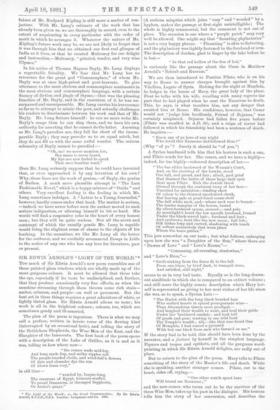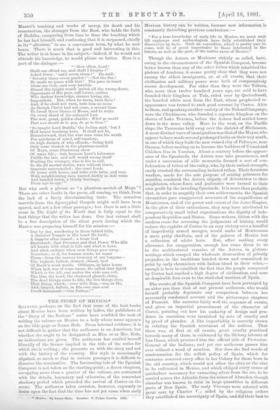SIR EDWIN ARNOLD'S "LIGHT OF THE WORLD."* Too much of
Sir Edwin Arnold's new poem resembles one of those painted glass windows which are wholly made up of the most gorgeous colours. It must be allowed that these take the eye, especially if its taste be undisciplined, and, further, that they produce occasionally very fine effects, as when the sunshine streaming through them throws some rich stain— amber, crimson, and purple—on wall or pavement. But the best art in these things requires a great admixture of white, or lightly tinted glass. Sir Edwin Arnold allows us none; his work is all in the brightest colours ; colours, too, which are sometimes gaudy and ill-assorted.
The plan of the poem is ingenious. There is what we may call a preface, written in heroic verse of the flowing kind (interrupted by an occasional lyric), and telling the story of the Bethlehem Shepherds, the Wise Men of the East, and the Slaughter of the Innocents. The first book of the poem opens -with a description of the Lake of Galilee, as it is and as it vas, telling us how where now— "the cranes wade mid-leg, And long reeds lisp, and milky ripples roll The purple-banded shells, and wind-falen flowers Of date and oleander dye the rim
Of blown foam rosy,"
in old time
wended by, league-long, The caravans of Egypt, treasure-stuffed, To proud Damascus, or thronged Sepphoris, Or Accho's quays."
* The Light of the World ; or, the Groat Consummation. By Sir Edwin Arnold, IC,C.I.E., O.S.I. London : Longmans and Co. 1>'1.
(A curious misprint which joins "rosy" and "wended" by a hyphen, makes the passage at first-sight unintelligible.) The whole is highly ornamental, but the ornament is not out of place. The occasion is one where a "purple patch" may very well be allowed. One might say that "flaunting phylacteries" is not a very happy phrase. " Flaunting" is akin to fluttering, and the phylactery was tightly fastened to the forehead or arm. The description of Jordan, glad to linger by the lake before he is lost-
" In that red hollow of the Sea of Lot,"
is curiously like the passage about the Oxus in Matthew Arnold's " Sohrab and Rustum."
We are then introduced to Pontius Pilate, who is on his way to Rome to answer charges brought against him by Vitellius, Legate of Syria. Halting for the night at Magdala, he lodges in the house of Mary, the great lady of the place. First be talks with his wife, recalling with many regrets the part that he had played when he sent the Nazarene to death. This, he says, is what troubles him, not any danger that awaited him at Rome. His confidence, however, that Caesar would not "judge him heedlessly, Friend of Sejanus," was certainly misplaced. Sejanus had fallen five years before (Pilate was recalled in A.D. 36), and a reign of terror bad followed in which his friendship had been a sentence of death. He inquires :-
" Know any of ye here of any wight Who loved this Nazarene and followed Him ?"
(Why "of ye "P Surely it should be "of you.") A Syrian handmaid tells him that his hostess is such a one, and Pilate sends for her. She comes, and we have a highly— indeed, far too highly—coloured description of her :— " The bar slides backward of the Woman's Court, And, on the stairway of the leewtn, stood
One tall, and proud, and fair ; albeit, past grief Had dimmed the lustre of those large dark eyes Bent upon Pilate. Rich the Jewish blood
Glowed through the sunburnt ivory of her face—
Unveiled for salutation—lending show Of colour to the thinned uncoloured cheek, But leaving pale as pearl-lined ocean-shell
The full white neck, and—where neck rose to breast—
The tender margins of the bosom, bound By silver-bordered cymar, crossed ;—and pale As moonlight's heart the low smooth forehead, framed Under the black-waved hair ; forehead and hair ; And eyebrows, bent like the now moon ; full lids; Silk lashes long and curved, shadowing with touch Of softest melancholy that worn place Where the tears gather."
This jars somewhat on our taste ; but what follows, enlarging upon how she was "a Daughter of the Sun," where there are " Dawns of Love " and " Love's Noons,"— " Consuming, all-revealing, shadowless," and " Love's Eves,"—
" Swift-sinking from the fierce fit to the lull From sun-blaze, by brief dusk, to tranquil stars, And satisfied, still night,"
seems to us in very bad taste. Equally so is the long-drawn- out similitude in which she is compared to an extinct volcano ; and still more the highly ornate description which Mary her- self is represented as giving to her next visitor of her life when she was, so to speak, a Syrian Lais :-
" The Harlot with the long black braided hair Who melted hearts in spiced pomegranate wine— Than Alexandrian Queen more prodigal,—
And laughed their wealth to want, and trod their pride Under her 'broidered sandals ; and took toll Of goods and gear, wasting in one wild bout The Temple's wealth ; till,—like that rose-faced One Of Memphis, I had reared a pyramid
With but one block from each who fawned on me."
If the story had to be told, this should have been done by the narrator, and a fortiori by herself in the simplest language. Figures and tropes and epithets, and all the gorgeous word- painting in which Sir Edwin Arnold delights, are sadly out of place.
But to return to the plan of the poem. Mary tells to Pilate something of the story of the Master's life and death. While she is speaking, another stranger comes. Pilate, cut to the heart, rides off, crying,- " Ono other watch spent here Will brand me Nazarene ; "
and the new-comer, who turns out to be the survivor of the three Wise Men, takes up his part in the dialogue. His hostess tells him the story of her conversion, and describes the
Master's teaching and works of mercy, his death and his resurrection, the stranger from the East, who holds the faith of Buddha, comparing from time to time the teaching which he has had himself, and confessing that it is surpassed, chiefly in its " altruism," to use a convenient term, by what he now hears. There is much that is good and interesting in this. The writer is at home in his subject,—indeed, if he would not obtrude his knowledge, he would please us better. Here is a part of the dialogue :—
" How often, Lord !
Shall one offend me, and shall I forgive Asked Peter : until seven times P' He said : Seventy times seven pardon ! '—Not the Sin ! He made no peace with that ! The pure in heart Alone see God; and very terrible Blazed His bright wrath 'gainst all the wrong-doers, Oppressors of His poor, self-lovers, scribes Who darken knowledge, sinners loving sin, Impenitent. But, when he turns, turn thou! And, if he shall not turn, hate him no more As though Christ had not come, a second time To break those Stones of Moses, and to write On every shard of his enlarglid Law The new, great, golden statute : What ye would That men should do to you, do ye to them!'
"So taught Lord Buddh,' the Indian said, 'but I Hail larger teaching here. It shall not be, Henceforward, that the wise man reins his wrath For quietness of mind, self-mastery, Or high disdain of who offends,—being held Only some shadow in the phantom-nautch Of Maya, some illusionary show Of sense life ;—but, because Love's tolerance Fulfils the law, and self would wrong itself Hurting the wronger, who is kin to self, So die all mortal strifes, wars without truce, Quarrels unreconciled ; the cruel feuds Of house with house, and tribe with tribe, and race With neighbouring race, nursed darkly in dull veins And handed down, a bloody heritage, From ago to ago.' "
But why such a phrase as "a phantom-nautch of Maya "? There are other faults in the poem, all coming, we think, from
the lack of a finely discriminating taste. The senseless marvels from the Apocryphal Gospels might well have been spared, and not a few other passages ; but there is not a little verse in The Light of the World that is fully equal to the best things that the writer has done. Our last extract shall be a fine description of the silent years during which the Master was preparing himself for his mission :—
" Day by day, wandering in those folded hills, A statelier Temple in His heart He built; A happier altar reared ; a truer God
Enshrined ; that Prosonce and that Power Who fills All hearts with what is Life and what is Love, And what endures when seen things pass away : Nameless ; or if, for human needs, we name Them—from the narrow treasury of our tongues— The highest, holiest, dearest, closest, best Of Earth's weak words. Ofttimes, in later hours When lack was of some name, He called that Spirit Which is the All, and makes the wide seas roll, The blue sky bend, the clustered planets shine, The dead things come to life, the live things live; That Being., which,—ever with Him,—was as He, And, largest, fullest, in His own sure soul Dwelt immanent—' Our Father.'"



































 Previous page
Previous page